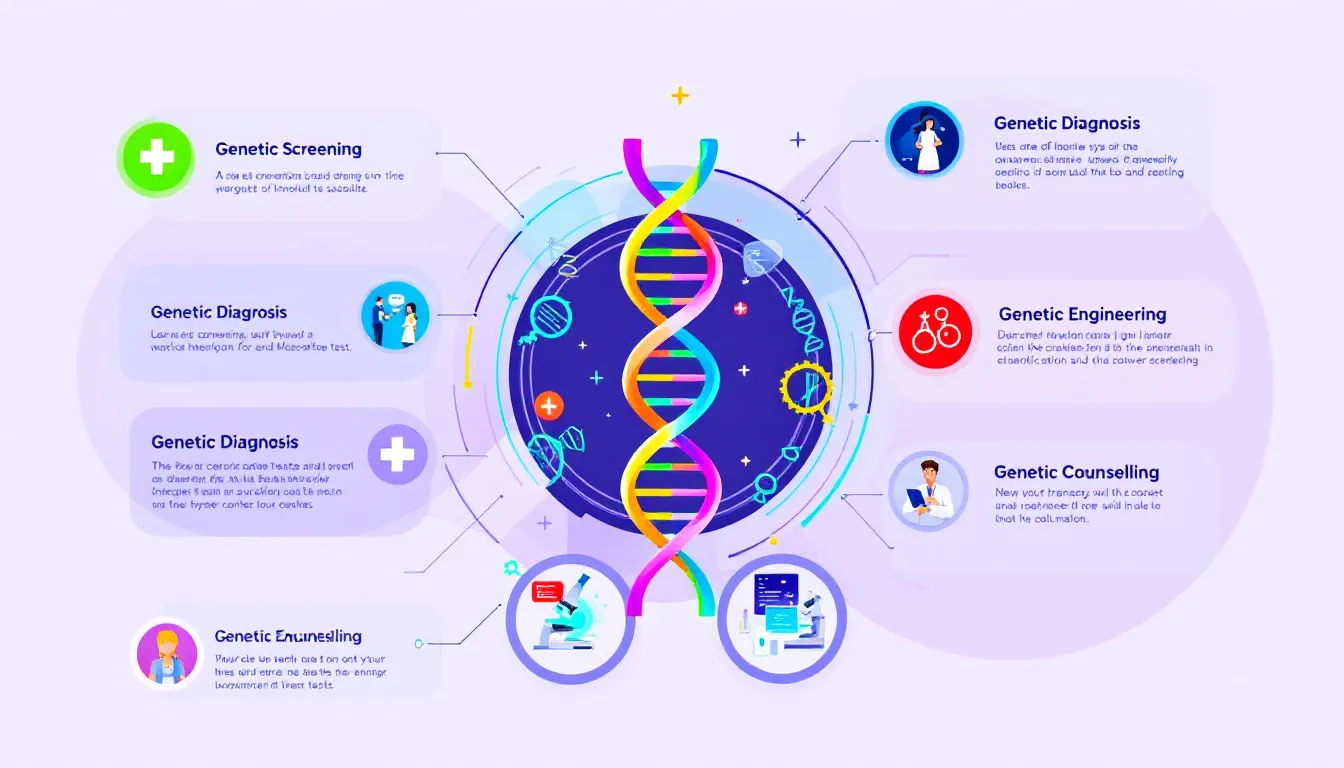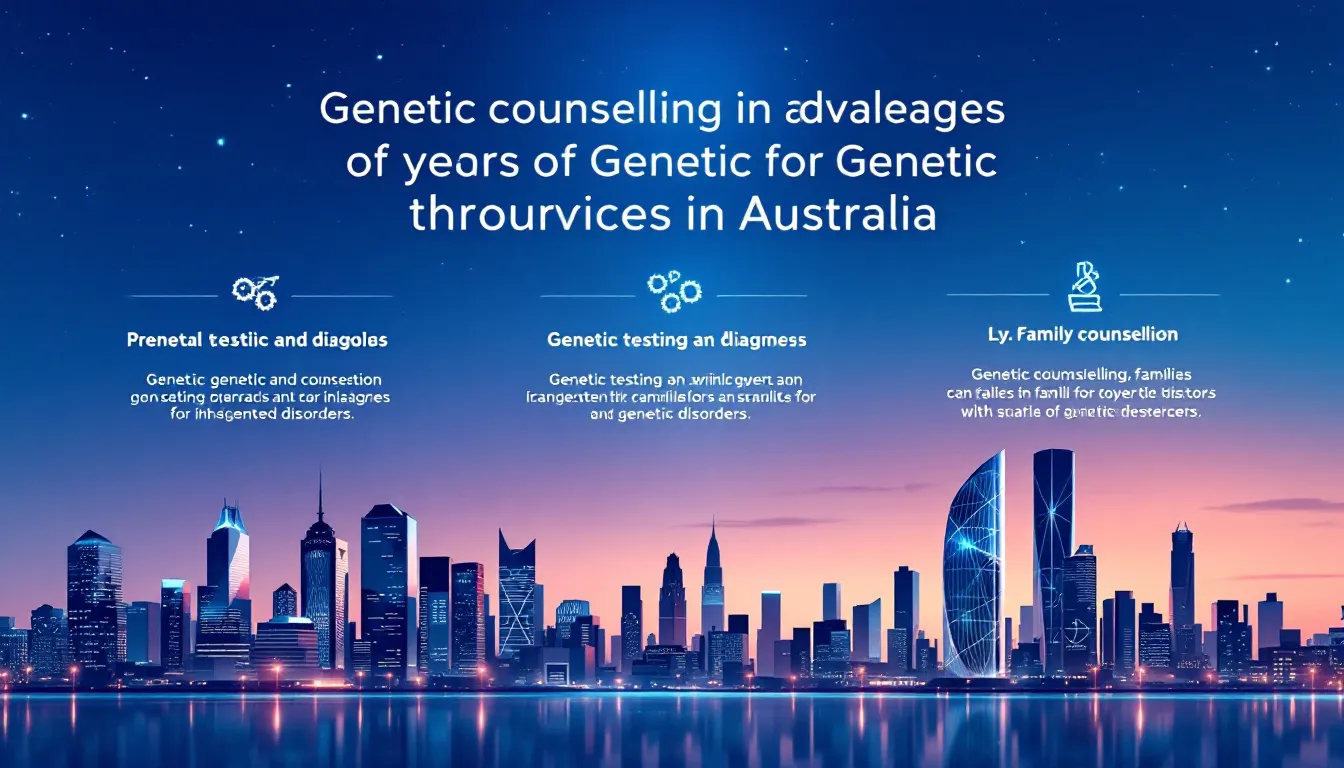In Australia, genetics test Australia provides early disease detection and personalized healthcare options. This article explores the available tests, the process, and their benefits. Whether you have a family history of genetic conditions or seek health insights, discover what genetic testing in Australia can offer.
Key Takeaways
Genetic testing in Australia provides critical insights into genetic predispositions, enabling early detection and proactive health management for individuals with a family history of diseases.
Various types of genetic tests, including single gene tests, genomic testing, and carrier screening, serve distinct purposes, allowing for targeted diagnosis and treatment plans.
The growing public acceptance and government support for genetic testing, coupled with advancements in technology, position Australia at the forefront of personalized healthcare.
The best genetics tests in Australia include the advanced methylation genetic test and MTHFR gene health do a very extensive genetic test and analysis.
Overview of Genetic Testing in Australia

Genetic testing examines genes for variations or mutations that can lead to medical problems. This process aims to identify genetic variations that may cause medical issues or elevate disease risk. Australians with a prior diagnosis of cancer, heart disease, or a family history of genetic disorders can access genetic testing. Such availability allows many Australians to benefit from early detection and preventive measures.
Australia offers a wide range of accredited genetic tests, including carrier screening for conditions like cystic fibrosis. Direct-to-consumer genetic testing has also gained popularity, allowing individuals to access genetic information without needing to go through traditional healthcare channels. In Australia, genetic tests are primarily conducted using blood samples, saliva, or buccal swabs, making the process accessible and straightforward.
Public interest in genetic testing for hereditary diseases is strong, demonstrating a demand for early insights into genetic predispositions. The positive early public response to pilot studies suggests an increasing acceptance of genetic testing services. Such growing acceptance is vital as we transition to a future where genetic information is central to personalized healthcare.
Types of Genetic Tests Available

There are various forms of genetic testing, each serving a distinct purpose. Single gene tests identify mutations in specific genes associated with hereditary conditions. For instance, single gene tests can detect mutations in the BRCA1 or BRCA2 genes, linked to higher risks of breast and ovarian cancers.
Genomic testing examines large sections of genetic sequences simultaneously, analyzing multiple genes at once. Whole Exome Sequencing (WES) focuses on DNA regions used to form proteins, aiming to identify disease-linked variants. Genome sequencing is a method that can also be used in this context. Non-Invasive Prenatal Testing (NIPT) screens for fetal genetic conditions using a safe blood test.
Expanded Genetic Carrier Screening evaluates individuals for over 600 genetic conditions, offering insights into inherited traits. Pharmacogenomics examines genes involved in drug metabolism and hypersensitivity to optimize medication use.
DNA relationship testing uses DNA markers to identify genetic relationships, serving both recreational and medical purposes. Gene panels investigate a specific number of genes and are commonly used in screening for genetic conditions.
How Genetic Testing Works
The genetic testing process includes sample collection, laboratory analysis, and result interpretation. Genetic testing involves analyzing DNA to identify genetic variants that may impact health.
It starts with collecting a sample, followed by laboratory analysis to examine genetic material for specific variants and mutations. Finally, the results are interpreted to offer insights into potential health risks and guide medical decisions.
Sample Collection Methods
Samples for genetic testing can be collected from blood, saliva, and cheek cells. Blood samples are commonly used and must be stored in specific tubes, like EDTA tubes, to preserve DNA quality. This method is often used for more comprehensive genetic tests that require a high-quality DNA sample.
Buccal swabs collect cells from the inside of the cheek and offer a non-invasive, cost-effective alternative to blood tests. Saliva samples are a convenient option, frequently used for direct-to-consumer genetic tests. Each sample collection method has its advantages and is selected based on the genetic test type.
Laboratory Analysis
Genetic testing laboratories use methods like polymerase chain reaction (PCR) and sequencers to analyze genetic material. Different sample collection methods provide various types of genetic material, influencing the laboratory analysis approach. For instance, blood samples might be preferred for tests requiring high-quality DNA, while buccal swabs are suitable for less intensive analyses.
Laboratory analysis examines genetic material for specific variants and mutations using techniques like sequencing and genotyping. Advanced tools like CRISPR and bioinformatics software offer deeper insights into genetic variations. The results indicate whether significant genetic variants or mutations are present and are interpreted by healthcare professionals.
Interpreting Results
Interpreting genetic test results requires understanding the context of detected gene variants and their potential health implications, including clinical interpretation. These results include data on genetic status and interpretation of its potential impact. Outcomes are classified into categories like positive, negative, and variants of uncertain significance.
Consulting a doctor or genetic counsellor to understand these results is important. They help patients navigate test outcomes, providing insights into potential health risks to guide informed decisions.
Genetic Counselling Services

Genetic counsellors provide crucial support by discussing risks and implications of test results. Genetic Counselling Australia employs trained counselors who guide patients through their genetic testing journey. They assist in understanding genetic conditions and their implications. Counselling services are tailored to meet individual needs, ensuring that patients receive personalized information.
Counselling sessions offer a safe environment for patients to ask questions and express concerns. The service promotes informed decision-making about genetic testing through education and support. Genetic counsellors help individuals comprehend genetic test outcomes and their health implications. They also help understand the risks associated with genetic conditions within families.
Common Genetic Conditions Tested in Australia
Common genetic conditions tested in Australia include cystic fibrosis, spinal muscular atrophy, and fragile X syndrome. Tests for hereditary breast and ovarian cancer focus on genetic predispositions that increase cancer risks. Inherited colorectal cancer syndrome tests identify genetic variants linked to some colorectal cancers.
About 1 in 20 Australians carries cystic fibrosis, spinal muscular atrophy, or fragile X syndrome, underscoring the importance of carrier screening. Genetic testing is crucial in identifying common inherited conditions that affect health.
Benefits of Genetic Testing

Genetic testing aids in diagnosing genetic conditions, which is vital for prompt medical intervention. It offers insights into the risk of developing certain diseases, enabling proactive health management. Genetic test results can guide tailored treatment strategies for specific genetic conditions.
Genetic information empowers individuals to make informed lifestyle choices that may improve their health. Individuals planning a pregnancy or concerned about inherited conditions should consider genetic testing. It offers critical insights for family planning and health management.
Reproductive carrier testing helps couples assess their risk of having a child with certain genetic conditions, with rebates between $300 and $340 available. This aids in making informed family planning decisions for those with hereditary conditions.
Risks and Considerations
Genetic testing involves complex ethical questions, such as whether individuals should have the right to choose or refuse testing. Mandatory genetic testing brings up concerns about personal rights versus public health interests. The ethical implications of genetic testing vary across different cultural and social contexts.
Inquiring about the provider’s privacy policies regarding genetic data protection is recommended. Releasing genetic test results to third parties can lead to unfair treatment and privacy violations. Testing for genetic predispositions can cause anxiety and stigma, affecting self-image.
Discrimination based on genetic information can impact employment and insurance coverage. Individuals have the right to control access to their genetic information, affecting their autonomy. Ordering genetic tests from overseas companies poses privacy risks and may expose private information.
Cost of Genetic Testing
Genetic test costs vary widely and may or may not be covered by Medicare. Common tests often require out-of-pocket expenses. Online-ordered genetic tests are generally not covered by Medicare.
In 2022-23, Medicare subsidized over 376,000 genetic tests, totaling around $76.8 million in benefits. The number of genetic and genomic tests subsidized by the Australian government increased from 32 in 2014 to 111 in 2023. In 2023, government funding for genetic testing in Australia reached AU$76.8 million, about 0.3% of total public medical services expenditure.
Recent years have seen a significant increase in genomic testing items, with 65 new items added since 2020.
Choosing a Genetic Testing Provider
Selecting the right provider for genetic testing is crucial for accurate results and proper guidance. Selecting an accredited provider ensures they meet specific standards in genetic testing. Providers with strong clinical support help interpret results and guide patients through testing processes.
Patient reviews and experiences offer insights into the reliability and quality of a genetic testing provider. Selecting a provider with a transparent genetic testing process can enhance patient trust and satisfaction. A reliable genetic testing provider is crucial for accurate results and proper guidance throughout the testing journey.
The Future of Genetic Testing in Australia

The future of genetic testing in Australia looks promising, with advanced techniques like next-generation sequencing used for genetic analysis. Modern sequencing technologies enable laboratories to analyze genetic material quickly and accurately. Australia’s DNA screening program aims to offer free population DNA screening to everyone.
If successful, the maximum population size planned for the DNA screening program is 1 million people and beyond. The second stage of the DNA screening program aims to screen 100,000 people or more. Genomic databases are expected to enhance risk assessments, disease detection, and targeted treatments in the future.
Summary
In summary, genetic testing in Australia offers a wide range of tests that can provide valuable insights into health risks and conditions. From sample collection to interpreting results, the process is supported by advanced technologies and professional genetic counsellors. While there are costs and ethical considerations, the benefits of early diagnosis and informed health decisions make genetic testing a valuable tool. As technology advances, the future holds even greater promise for personalized healthcare.
Frequently Asked Questions
What types of genetic tests are available in Australia?
In Australia, a variety of genetic tests are available, including single gene tests, genomic testing, whole exome sequencing, non-invasive prenatal testing, expanded carrier screening, pharmacogenomics, and DNA relationship testing. These options cater to different health and familial inquiries.
How are genetic samples collected?
Genetic samples are typically collected from blood, saliva, or cheek cells, with blood being used for comprehensive tests and buccal swabs or saliva serving as non-invasive options. Each method provides valuable genetic information with varying levels of convenience.
What are the benefits of genetic testing?
Genetic testing offers significant benefits by aiding in the diagnosis of genetic conditions, assessing disease risk, guiding personalized treatment plans, and informing family planning choices. These insights can empower individuals to make informed health decisions.
Are there any risks associated with genetic testing?
Genetic testing does carry risks such as ethical dilemmas, privacy issues, and potential discrimination based on the findings. It is advisable to discuss these concerns with healthcare professionals before proceeding.
How much does genetic testing cost in Australia?
Genetic testing in Australia can vary significantly in cost and may not always be covered by Medicare, leading to potential out-of-pocket expenses. However, some tests may benefit from government funding and subsidies. It is advisable to consult with a healthcare provider for specific pricing and coverage options.
